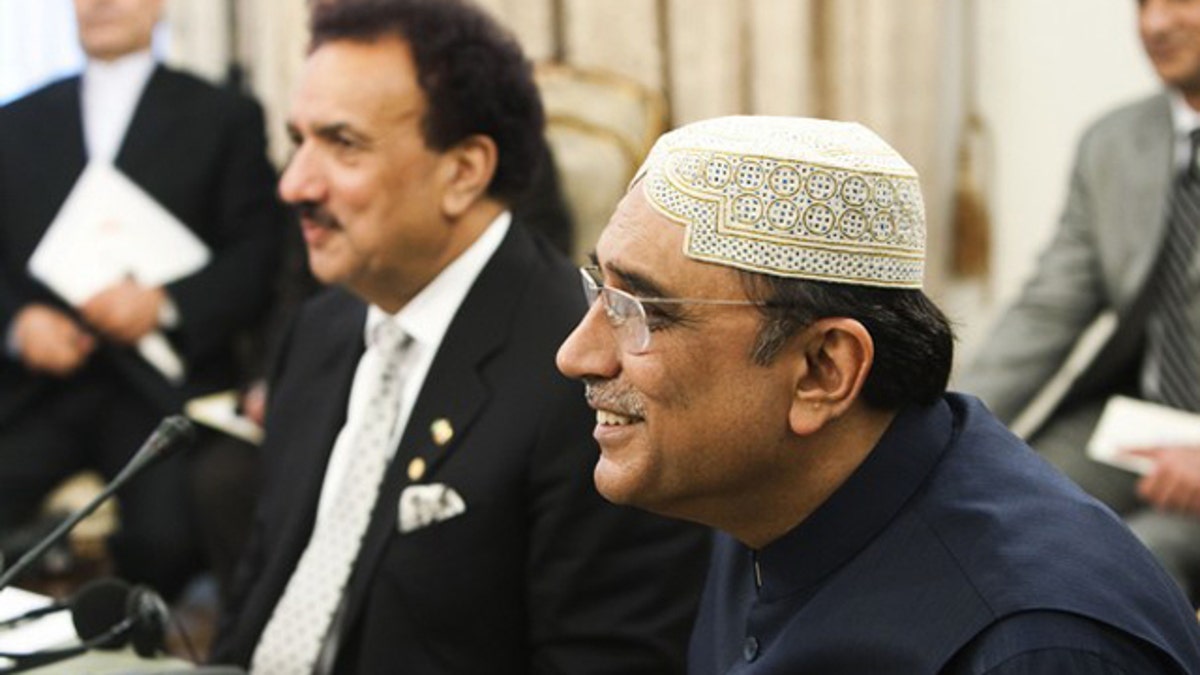
FILE: Pakistani President Asif Ali Zardari, right, and Pakistani Interior Minister Rahman Malik attend a trilateral meeting with their Iranian and Afghan counterparts in Tehran June 24. (Reuters)
ISLAMABAD – Pakistani President Asif Ali Zardari will likely need two weeks to rest in Dubai following medical treatment there before he returns home, the prime minister said in comments that could add to speculation about the leader's health and whether he is losing his grip on power.
Zardari flew to Dubai last week for treatment related to a heart condition, setting of rumors he was fleeing army attempts to oust him.
The government initially said the trip was routine and the president would be home in a few days. But reports have surfaced since then that Zardari's condition was more serious, with some unnamed officials saying he suffered a mini stroke.
Prime Minister Yousuf Raza Gilani denied the president had a stroke in an interview with the British Broadcasting Corporation late Sunday. He said Zardari needed medical attention because he was "exhausted."
"That was the reason and now his tests are clear, and he is improving," said Gilani. "I did talk to him, and he has been talking to other Cabinet ministers as well. He sounded very well."
The president's supporters say the stories about his health and ulterior motives for going to Dubai have been whipped up by his political opponents. Speculation of military moves against the civilian government are common in Pakistan because the army has staged several coups and ruled the country for much of its history.
Zardari has been under serious pressure since the Pakistani ambassador to the U.S., a key ally, was forced to resign amid allegations he sent a memo to Washington asking for its help in preventing a supposed military coup following the American raid that killed Osama bin Laden in May.
The operation in a Pakistani garrison town outraged officials because they were not told about it beforehand.
Mansoor Ijaz, a U.S. businessman of Pakistani origin, has claimed that former Ambassador Husain Haqqani crafted the memo with the support of Zardari. Both Haqqani and the president have denied the allegations.
Zardari has been asked to appear before the Supreme Court in its investigation into the memo scandal. The first hearing is scheduled for Dec. 19, and the president will submit his reply to the court if he has not returned from Dubai, said Zardari's spokesman, Farhatullah Babar, according to Pakistan's leading English-language newspaper, Dawn.
The State Department has said the U.S. believes Zardari's trip to Dubai is "completely health-related" and not connected to the memo scandal.
In September, Zardari underwent an angiography -- a medical imaging technique used to visualize the blood vessels of the heart -- and some routine medical tests at London's Royal Brompton Hospital and was reported to have received a clean bill of health.
Washington is likely watching Zardari's situation very carefully since Pakistan is a key player in the war in neighboring Afghanistan. The president is seen as a fairly strong ally of the U.S., but the relationship between the two countries has steadily deteriorated over the last year.
Ties were strained most recently by NATO airstrikes that killed 24 Pakistani soldiers at two army posts on the Afghan border on Nov. 26.
Pakistan called over a dozen of its envoys back to Islamabad for a rare two-day meeting, which started Monday, to discuss the country's relationship with the West in the wake of the border attack. Foreign Minister Hina Rabbani Khar and the head of the army's Inter-Services Intelligence agency, Lt. Gen. Shuja Pasha, attended the meeting.
Pakistan retaliated against the attack by blocking its Afghan border to NATO supplies, boycotting an international conference aimed at stabilizing Afghanistan and demanding the U.S. vacate an air base used by American drones.
The U.S. left Shamsi base in southwestern Baluchistan province on Sunday, meeting the deadline imposed by the Pakistani government. The move is not expected to significantly impact the covert CIA drone program in Pakistan.
